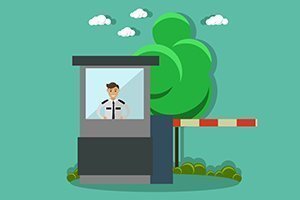Security guards regularly find themselves interacting with people who are angry, hostile, and even violent (or potentially so). These situations are stressful and fraught with safety and liability risks. In these moments, strong communication and conflict management skills are crucial. Underpinning these skills and strategies is something inherently human…empathy. Empathy allows you to genuinely understand and respond to the emotions, motivations and perspectives of others, significantly improving your conflict management capabilities.
In this post, we will take an in-depth look at empathy. We will explore what it is, why it matters, and practical ways to cultivate and use it in your personal and professional interactions.
Understanding Empathy
Empathy is the ability to understand and share the emotions of others. Going beyond sympathy or pity for another’s troubles, empathy is a deeper understanding of their emotional experience and perspective. Empathy can be categorized into two distinct, but interconnected types:
Affective Empathy: This involves actually feeling the emotions of the other person directly. For example, you encounter a parent who’s small child has just wandered off. If you are a parent yourself, you may feel the fear and panic that the parent is experiencing.
Cognitive Empathy: This is the ability to understand someone else’s emotions and point of view, without necessarily feeling the emotions yourself. If a parent approaches you because they’ve lost their child, but you have no children of your own, you may still be able to understand that they are feeling afraid and panic. This “perspective-taking” helps you understand what is driving the parent’s behaviour and decision-making in that moment.
Both affective and cognitive empathy are vital to effective conflict management. The awareness they provide allows you to identify the feelings, concerns and motivations behind the behaviour. Addressing root-cause removes the need for the confrontational or aggressive behaviour, resulting in a more rational and reasonable interaction.
Why Empathy Matters in Conflict
Empathy is crucial for security guards because it directly contributes to de-escalation and conflict resolution. It enables a more fundamental human connection and builds rapport.
De-Escalation: Empathy allows you to recognize the underlying fears and frustrations that may be driving the other person’s aggressive behaviour. By acknowledging these feelings, and focusing on addressing the underlying issues, you can help the person to lower their emotional intensity by reducing the level of perceived threat.
Rapport Building: Demonstrating empathy fosters trust and respect, making cooperation and collaboration more likely.
Improved Communication: Empathetic communication ensures that your responses are sensitive and resonate with the other person, reducing misunderstandings, and encouraging cooperation.
For example, imagine that an already frustrated visitor is suddenly surrounded on all sides by four security guards, leading to a further escalation in their behaviour. Recognizing that the sudden show of force is likely making the person feel threatened and unsafe, you could direct the other security guards to move back further, and assure the visitor that they are only here for everyone’s safety. This added space and reassurance addresses the root cause of the concern, which should lead to a de-escalation in the visitor’s behaviour.
How to Cultivate Empathy
Empathy isn’t a trait that you either have or don’t have. It is something that can be developed and strengthened. Here are some methods for cultivating empathy:
Develop Active Listening Skills: Active listening requires you to fully engage with what someone is saying. It encourages perspective-sharing and understanding. Active listening is non-judgemental, and involves acknowledging the other person’s feelings, and reflecting back your understanding through restating and paraphrasing.
Example: A visitor explains to you that they are upset because they are lost and late for an important appointment. They complain that the signage is confusing and poorly designed. You may begin your response by acknowledging that the signage isn’t the best, and that you can understand how they could have gotten lost trying to find a specific location. You can then help them to quickly and efficiently find their destination.
Identify Common Ground: Look beyond the obvious differences and find aspects of the situation where you share the same perspective. Focusing on shared interests builds rapport and makes it seem more like you’re working as a team, rather than as adversaries.
Example: When dealing with a customer who is frustrated over the high cost of parking, Tell them that you can relate, as even the employees have to pay to park (if that is true). Now instead of them viewing you as the face of the organization they’re upset with, you’re just another poor victim of what they perceive as an unfair policy.
Imagine Yourself in Their Situation: Putting yourself in the other person’s shoes helps you to appreciate and understand why they are reacting the way they are.
Example: If someone is acting irrationally or “overreacting” to a situation, ask yourself how might you feel if you were in exactly the same situation? That “overreaction” might not seem so irrational after all!
Use Language That Creates Connection: Utilize language that emphasizes cooperation, mutual respect and humanity.
Example: Rather than assertively issuing commands, calmly request their cooperation. Try using phrases like, “Is there a way we can resolve this together?” Or “What do you need from me right now that will help us meet our needs?”
Continuous Self-Reflection and Practice: Reflect on past interactions and look for ways in which you could have been more empathetic, and how that may have improved the outcome. Self-assessment helps you to recognize patterns in your own behaviour, and identify opportunities to improve.
Example: Following an intense encounter with a trespasser, consider how the interaction played out. What did the subject say to you and how did you respond? How did the subject respond to what you said to them? Did you show them any empathy, and in what way? Would the outcome have been better with a modified approach?
Empathy-Building Exercises: Regularly engage in empathy-building exercises such as role-playing, to better understand how to employ empathy-based communication strategies and build your skills.
Example: Seek out training opportunities that utilize scenario-based role plays in their communication skill development.
Mindfulness and Emotional Awareness: Learn and practice mindfulness to help you stay focused and attuned to your own emotional reactions to situations. Being aware of your own emotions makes it easier to correctly identify the emotions of others.
Example: Take brief pauses during your interactions to check in with yourself, especially if you detect a sudden shift in your emotional state. Identify what new emotion you’re experiencing and consider the reason for it.
Empathy in Real Life
Consider the following realistic scenarios and how empathy can improve outcomes:
Dealing with a Disoriented Visitor: You happen upon a visitor who appears lost and is increasingly agitated. You take an empathetic approach by saying, “Hi there. I’m with security here. It looks to me like you may be lost and a little frustrated. Can I help you find your way?” This approach reassures the visitor that you understand their predicament and are offering to help them.
Managing Aggression Due to Frustration: A patient in the emergency waiting room becomes verbally aggressive due to the long wait time to be seen by a doctor. Rather than responding assertively and telling them to calm down and behave, you empathize with them. “I know it’s a long wait and that you’re not feeling well. I’ve had to wait in emergency rooms myself, and it is very frustrating. I can assure you that the staff are working as fast as they can, but they are overwhelmed. If you’d like, I can go and check on how things are going inside, and maybe provide you with a bit of an update. How does that sound?” This approach addresses the patient’s feelings of frustration, identifies a common ground, and offers a collaborative and helpful option.
Addressing Fear or Anxiety: If someone appears nervous or hesitant to provide a witness statement about an assault they witnessed, it may be due to fear of retaliation. You may address it by acknowledging that it’s normal to not want to get involved, especially when you think it’s risky. But it is important to hold people accountable for their actions, and their information can help make that happen. By bringing their underlying fear out into the open and normalizing it, the intensity of the emotion can be reduced. Reminding them that they have an opportunity to help others can motivate them to want to be helpful.
Conclusion
Empathy is much more than a desirable trait. It is an essential part of a security guard’s communication skill set. By applying empathetic strategies such as active listening, shared identity recognition, mindful communication and continuous self-reflection, you can significantly enhance your ability to manage conflicts and obtain compliance.
Incorporate empathy into your daily interactions to create safer, more respectful conversations. Not only will it improve your effectiveness as a security guard, it will contribute to a more positive and professional environment for everyone. If you would like to learn more about empathetic communication, please check out our online training programs at SecurityGuardCourse.ca.
References
Cambridge University Press. (n.d.). Empathy. Cambridge Dictionary. Retrieved June 13, 2025, from https://dictionary.cambridge.org/dictionary/english/empathy









